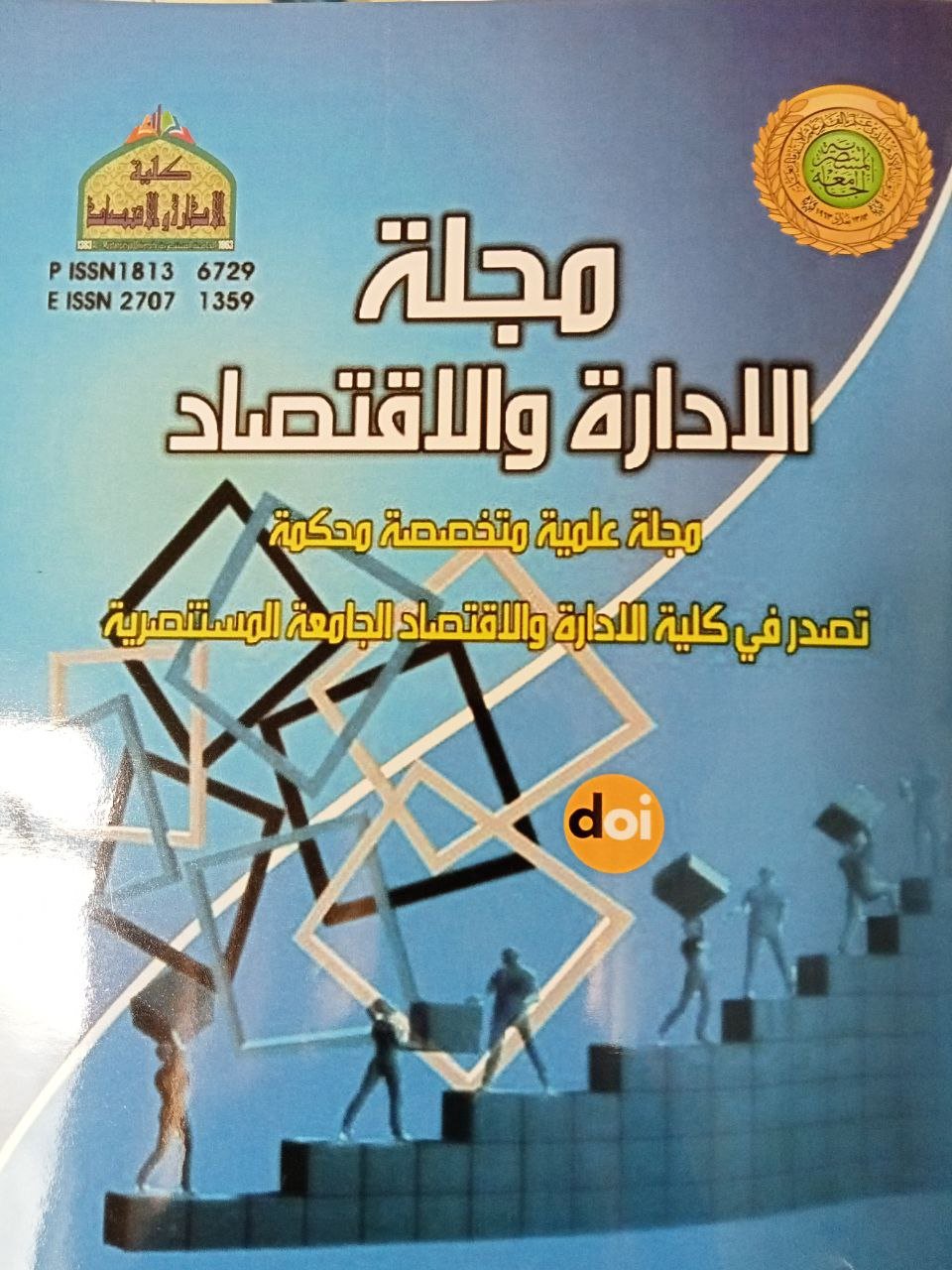أثر ممارسات القيادة الالكترونية في الجاهزية التنظيمية – بحث ميداني في الشركة العامة للمنتوجات الغذائية
DOI:
https://doi.org/10.31272/jae.i138.1110الكلمات المفتاحية:
القائد، القيادة الكترونية، الجاهزيةالملخص
يكمن الغرض الرئيس من البحث في معرفة مدى الاعتماد على القيادة الالكترونية واثرها في الجاهزية التنظيمية لاسيما الظروف غير المتوقعة التي تطرأ في بيئة الاعمال ولعل أبرزها (كوفيد-19) التي أدت الى نتائج حاسمة منها توقف الاعمال لفترة محدودة ، مما تطلب إدارة الاعمال الكترونياً. اذ تمثلت عينة البحث في الشركة العامة للمنتوجات الغذائية وكان عدد الاستبيان الصالح للتحليل (190) استبانة ، وتم التوصل الى العديد من النتائج أهمها اثبات دور القيادة الالكترونية في الجاهزية التنظيمية اذ اشارت نتائج اجابات افراد العينة ارتباطا بين متغير القيادة الالكترونية في الجاهزية التنظيمية بواقع (62%) كما بلغ معامل التأثر بين المتغير المستقل والمتغير التابع (50%) ، الذي يعود بدوره على المديرين لتبني مفهوم القيادة الإلكترونية للتفاعل والتأثير في بيئتهم على الرغم من الاختلاف في مستوى الجاهزية الادارية .
المراجع
First: Journals
- Albidewi, Ibrahim, (2014). E-leadership system: A futuristic vision, International Journal of Business and Management Review, Vol. 20, No. (2).
- Alqudah, Mohammad Ali & Muradkhanli, Leyla, (2021), Electronic Management and Its Role in Developing the Performance of E-government in Jordan, Electronic Research Journal of Engineering, Computer and Applied Sciences, Vol. (3).
- Andrew، Anthony., (2017), Relationship between Employee Readiness for Organizational Change and Employee Performance, Journal for Studies in Management and Planning, Volume (3) Issue, (1) January.
- Avolio, Bruce J., & Kahai Surinder S., (2003), Adding the “E” to E-Leadership: How it may impact your leadership. Organizational Dynamics, Vol. (31), No. (4).
- Blau, Ina & Presser, Ofer, (2013), e-Leadership of school principals: Increasing school effectiveness by a school data management system. British Journal of Educational Technology, Vol. (44), No. (6).
- Chamakiotis, P., & Panteli, N. (2011), E-leadership styles for global virtual teams, IGI Global.
- Faulks, Baira, Song, Yinghua, Waiganjo, Moses, Obrenovic, Bojan and Godinic, Danijela, (2021), Impact of Empowering Leadership, InnovativeWork, and Organizational Learning Readiness on Sustainable Economic Performance: An Empirical Study of Companies in Russia during the COVID-19 Pandemic, Sustainability, Vol. (13).
- Gonaim, Faiza Adil, (2021), Electronic Leadership in Time of Crisis: Challenges and Opportunities in the Light of COVID-19 Quarantine, International Journal of Education, Culture and Society. Vol. (6), No. (2).
- Hejazi, Aylin, Abdolvand, Neda & Harandi, Saeedeh Rajaee, (2016), Assessing The Organizational Readiness For Implementing BI Systems, International Journal of Information Technology Convergence and Services (IJITCS) Vol. (6), No. (1).
- Kaplan, Robert S., & Norton, Daved P., (2004), Measuring the strategic readiness of intangible assets. Harvard business review, Vol. (82), No. (2).
- Kislov, Dmitry E., Bakalin, Vadim A., Pimenova, Elena A., Verkholat, Valentina P. & Krestov, Pavel V., (2017), An electronic management system for a digital herbarium: development and future prospects, Botanica Pacifica: A Journal of Plant Science and Conservation, Vol. (6), No. (2).
- Lalic, Bojan & Marjanovic, Ugljesa, (2011), Organizational Readiness / Preparedness, E-Business Issues, Challenges and Opportunities for SMEs: Driving Competitiveness. IGI Global.
- Mohammad, Khawaj, (2009), E-Leadership: The Emerging New Leadership for the Virtual Organization, Journal of Managerial Sciences, Vol. (3), No. (1).
- Shiri, Soheila, Anvari, Alireza, & Soltani, Hassan, (2015), Identifying and prioritizing of readiness factors for implementing ERP based on agility (extension of McKinsey 7S model), European Online Journal of Natural and Social Sciences, Vol. (4), No. (1).
- Van Wart, Montgomery, Roman, Alexandru, Wang, XiaoHu & Liu, Cheol, (2016), Operationalizing the definition of e-leadership: identifying the elements of e-leadership, International Review of Administrative Sciences, Vol. (0), No.(0).
- Weiner, J Bryan, (2009) A theory of organizational readiness for change, Implementation science Vol. (4), No. (67).
Secondary: Conference
Peterson, Ryan R., Fairchild, Alea M., (2003), Exploring the Impact of Electronic Business Readiness on Leadership Capabilities in Information Technology Governance, Proceedings of the 36th Hawaii International Conference on System Sciences.
Shahrasbi, Nasser & Paré, Guy, (2014), Rethinking the Concept of Organizational Readiness: What Can IS Researchers Learn from the Change Management Field?, Published by Twentieth Americas Conference on Information Systems, Savannah.

التنزيلات
منشور
إصدار
القسم
الرخصة
مجلة الإدارة والاقتصاد هي مجلة مفتوحة المصدر حيث تكون جميع محتوياتها مجانية. تخضع مقالات هذه المجلة لشروط ترخيص المشاع الإبداعي المنسوب إلى المؤلف (CC-BY 4.0) (https://creativecommons.org/licenses/by/4.0/legalcode) الذي يسمح للمرخص لهم دون قيود بالبحث عن النص الكامل للمقالات أو تنزيله أو مشاركته أو توزيعه أو طباعته أو ربطه به، وفحصه للفهرسة وإعادة إنتاج أي وسيلة للمقالات بشرط أن ينسبوا إلى المؤلفين الفضل في ذلك (الاستشهاد). تسمح المجلة للمؤلفين بالاحتفاظ بحقوق الطبع والنشر لمقالهم المنشور.
. Creative Commons-Attribution (BY)









